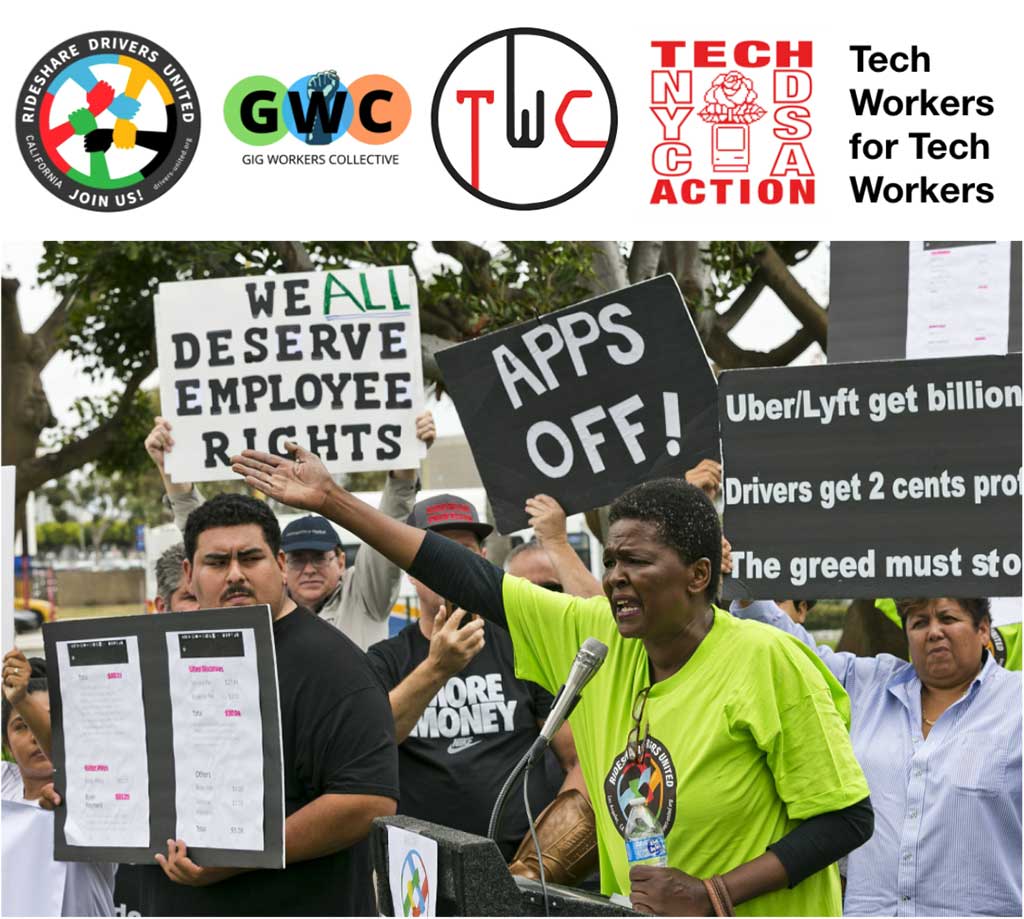Issue 2: Tech Workers Stand With Gig Workers Against Prop 22 Going National
14 Jan 2021
Inspired by worker organizing and Tech Workers for Tech Workers, we’re making commitments. In 2020 we saw Uber, Lyft, Instacart, and other “gig” companies spend over $205 million to deceive voters and remove worker rights in California. These companies are already using the same playbook to push their substandard, “low-rights” worker classification nationwide. Now, volunteers in TWC are preparing to organize our peers in solidarity with our coworkers who do app-based work. Read and sign our solidarity statement.

Esterphanie St. Juste, ridehail driver and RDU organizer, speaking at the May 8 2019 strike / Source
Sign here to stand with “gig” workers organizing for fair work for all of us.
2020 was a brutal year for many “gig” and app-based workers. As Lyft driver Nicole Moore says, “80% of us found new gigs or went on UI. Some of us caught COVID in our car.” And in the November 2020 election, California passed Proposition 22, a ballot initiative written by Uber and other gig companies that removes rights for all app-based workers by reclassifying workers in a way that reinforces exploitation and impoverishment.
Many of us who build tech and benefit from tech privilege have felt separated from our “gig” coworkers and their concerns. But with Prop 22, we know gig companies will try to exploit our labor, too. We already see efforts to cut worker protections for office and remote tech jobs. That’s why we’re joining app-based drivers, shoppers, and couriers who are fighting back.
We stand in solidarity with app-based workers organizing for fair, dignified working conditions for all of us.
As tech workers who allied with our app-based coworkers against Prop 22, we saw how gig companies deceived voters. Uber, Lyft, Instacart, DoorDash, Postmates and others spent over $205 million to pass Prop 22, the most ever spent on a state ballot initiative. Their campaign coerced gig company staff, including some of us, by tying promotions to work done to pass Prop 22; used in-app pop-ups to deceive riders and drivers; paid actors to pose as workers making false claims about Prop 22’s benefits; created fake ‘progressive’ voter guides to deceive well-meaning liberals; cultivated a “troll army” to harass critics; and capitalized on sympathies with racial justice by paying for an NAACP endorsement. One NPR station simply read a Yes on 22 campaign statement calling Prop 22 “a win for social justice,” showing how gig companies steal progressive language like they steal wages.
For years, gig companies marketed themselves as providing workers with flexibility. In reality, they exploited and coerced them with bait-and-switch pay and bonus schemes. Prop 22’s new worker classification (so-called “IC+”) makes things even worse:
- Prop 22 keeps rights out of reach for app-based workers, such as minimum wage, overtime pay, expense reimbursements, meal breaks, rest breaks, sick leave, and more. And while an Uber-backed poll claimed most workers “don’t want to be employees,” peer-reviewed research suggests that workers fear these companies may be exploitative employers. App-based workers want flexibility, but also expanded rights and protections that give them basic benefits and safety – as stated in the Driver’s Bill of Rights, written by drivers themselves.
- Prop 22 legalizes pay below minimum wage and offers inadequate benefits. Its wage guarantee is based on “engaged time” doing gigs, not the 40% of time spent waiting for a gig, and is only worth $5.64 an hour. It also offers a tiny health insurance stipend based on hours worked per week, but companies set a high bar for eligibility, charge a fee of $1.50 or $2 to every ride or delivery, and cut default tipping from 15% to 0%.
- Prop 22 mainstreams deception about worker rights. Uber, Lyft, and other gig companies know Prop 22 is harmful to workers, so their campaign deceived voters with false promises to set their law in stone. Workers had no say in Prop 22, and issues related to app-based workers rights can only be addressed through a virtually impossible 7/8ths majority of the California Legislature.
In 2021, Uber and other companies are working to take Prop 22 nationwide. They’ve poured millions into regional political action committees, creating fake “independent work” groups to manipulate voters and pursue their anti-worker legislation in Colorado, Illinois, Washington, and New York, just like they did in California. The gig oligarchy has shown us how far it is willing to go to serve its interests. But, it has also shown us how much it fears the power of organized workers and allies.
App-based workers are tech workers. They deserve dignity and decent work. They deserve ownership of their labor and the power to shape their working conditions. We all do. But if Prop 22 and its substandard worker category go national, we all lose. Some of us build the tech that enables exploitation of our app-based coworkers. We know our responsibility to resist. As volunteers with Tech Workers Coalition, NYC DSA Tech Action, and Tech Workers for Tech Workers, we stand in solidarity with the grassroots worker organizers in Rideshare Drivers United and Gig Workers Collective. In the months ahead, we commit to:
- Rallying material support and funding for app-based worker leadership in grassroots organizing, in initiatives like Tech Workers for Tech Workers.
- Organizing ourselves and our privileged peers building tech at gig companies in solidarity with our low-paid coworkers doing “gig” work.
- Providing technical assistance to develop appropriate digital tools and infrastructure.
When workers unite and organize, we win. Take these actions to stand in solidarity with app-based workers:
- Make a monthly donation to support workers organizing by Rideshare Drivers United and Gig Workers Collective.
- Join our gig work solidarity mailing list to get involved or stay connected.
- Share this statement with your networks to raise awareness of what’s at stake in 2021.